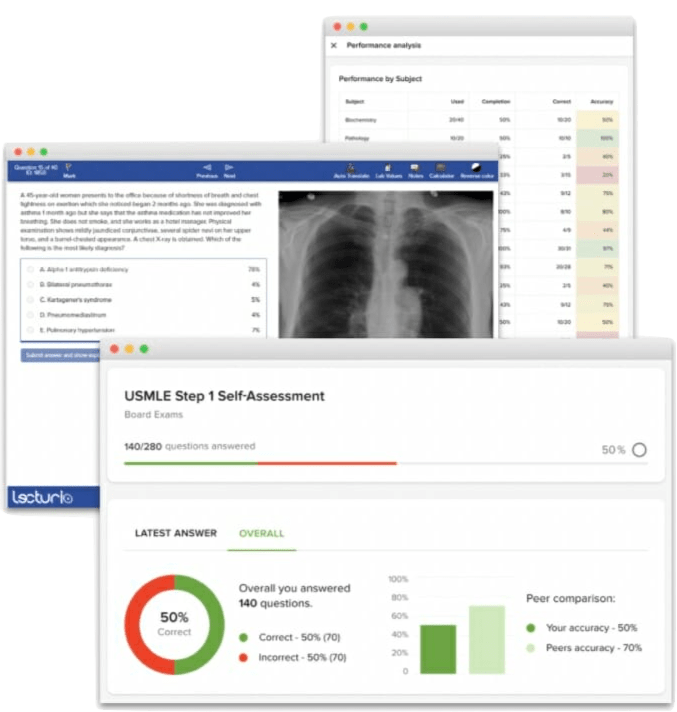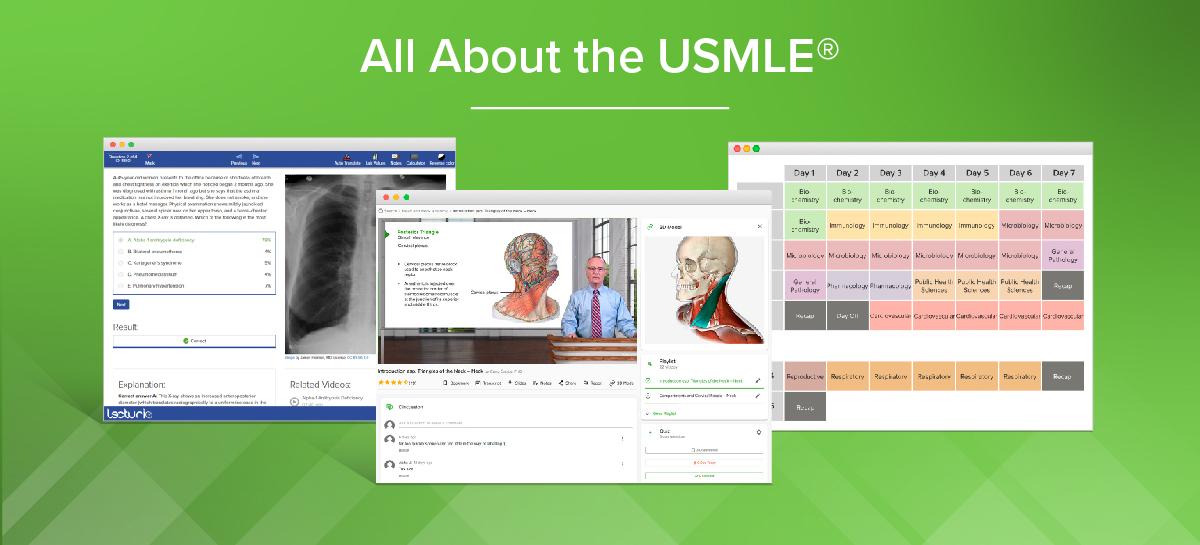USMLE® Step 2 CK Overview
The USMLE® Step 2 (also known as Step 2 Clinical Knowledge, or CK) is one of three standardized exams required to earn your medical license in the United States.
Although study preparation is key, understanding the layout of the exam is also critical to your success! You will need to focus on developing mastery of important physician tasks, physiological conditions, and diseases before taking the test. Once you’ve felt like you’ve mastered those topics, focus on getting the best possible score. Remember, you need a passing score on Step 1 (which changed to pass/fail score reporting on January 26, 2022) and Step 2 in order to take Step 3. In the past, you would have also been required to pass an in-person clinical skills assessment, also known as Step 2 CS, before being allowed to sit for Step 3. Step 2 CS was suspended in 2020 due to the COVID-19 pandemic, and the exam was discontinued in early 2021. You may still see references to Step 2 CK and CS on the NBME® website and elsewhere, but it is no longer required for licensure.
When Should I Take Step 2 CK?
Unlike Step 1, Step 2 is designed to test knowledge learned during your clinical rotations. The specific disciplines tested on Step 2 are Medicine, Surgery, Pediatrics, Obstetrics & Gynecology, and Psychiatry:
| Medicine | 50%–60% of questions |
| Surgery | 25%–30% |
| Pediatrics | 20%–25% |
| Obstetrics & Gynecology | 10%–20% |
| Psychiatry | 10%–15% |
For that reason, we highly recommend at a minimum completing these core clinical rotations before sitting for the exam, and then taking the test shortly after, when the material is fresh in your mind. For example, if you finish your clinical rotations in your third year of medical school, then you might plan to take Step 2 the summer before you submit your ERAS application. If you didn’t do particularly well on your shelf exams, you may want to take extra time to reinforce concepts you struggled with prior to sitting for the exam.
With the recent changes in Step 1 score reporting to pass/fail, Step 2 is now the first “numeric” score reported for licensure exams. Since this change was so recent, it’s not yet clear how Step 2 scores will be used for the purposes of extending interviews or ranking applicants for residencies. You should talk to your medical school advisor or prospective program directors directly to see how programs are handling this change.
Once you apply to take Step 2, you will need to choose a 3-month eligibility period in which to take the exam. Choose this period carefully, as not every Prometric testing center offers the exam. If your local Prometric testing center doesn’t offer Step 2, you will need to organize travel and strategically plan your residency application steps.
What Should I Expect on Step 2 CK?
Step 2 CK is a day-long exam consisting of eight 60-minute blocks, with an hour of break time. Each block contains no more than 40 questions (although there may be fewer), with no more than 318 questions total. While Step 1 is an exam based on the foundations and basic science underpinning medicine, Step 2 is a much more clinically-focused exam, concentrated on the application of medical knowledge to specific scenarios. For example, you may be asked to:
- Provide a diagnosis and prognosis
- Apply basic science knowledge to specific clinical situations
- Determine the next step(s) in patient management
There are three major types of questions you will have to answer on Step 2:
Traditional questions
Traditional questions are patient-centered vignettes with four or more multiple choice answers. The correct answer will not be as simple as you may think. Why? Multiple answer options can be partially correct, but there is only one choice that is the best answer. You should double-check your answer to make sure it’s not only technically correct, but also the best answer option.
Sequential items
Sequential items are a single patient-centered vignette followed by 2 to 3 consecutive questions.
Be careful! Once you mark your answer choice and move on to the next question, you will not be able to change your answer for the previous question in this small series.
If you are unsure about a question, use your best judgment to make an educated guess. Any unanswered questions will automatically be counted as incorrect, so any answer is better than no answer.
Scientific abstracts
Abstract questions provide a sample or excerpt of a medical journal or research publication and ask you to interpret the data provided in order to answer a question. This format is normally used to test biostatistics and data interpretation, but it may also ask you to apply the information in the abstract to the care of a particular patient, or ask you to identify potential sources of bias or limitations of the data. Familiarizing yourself with the format of abstract questions on the NBME® website is the best way to prepare for exam day.
What Score Do I Need on the Step 2 CK?
Step 2 is the first numerically scored exam you will have to take before applying for residency, as Step 1 has migrated to pass/fail scoring.
The current minimum passing score for Step 2 is 209.
While in theory, 100% of students could pass Step 2, historically, the pass rate has varied between US medical graduates and international medical graduates:
| Location | Passing Rate |
| U.S. or Canada | 96% |
| Outside the U.S. or Canada | 71% |
While 209 is the minimum passing score for Step 2, some residency programs may use a higher cutoff to decide whether or not to interview applicants for a position, or when ranking applicants. It’s important to be aware of what an expected score might be for your intended specialty, and to prepare diligently to get the best score possible on exam day.
Keep in mind that you are not allowed to retake Step 2 in order to attempt to score higher – make your first try your best try!
Scores are released about 3 to 4 weeks after your exam takes place, usually on Wednesdays. Those results will remain available for 120 days. If you fail the Step 2 exam, you will still be able to retake it while you still meet eligibility requirements. Keep in mind, however, that attempts are limited – the total number of allowed attempts is four, as of July 1, 2021. Any failed attempt will remain on your record, so make sure you are well-prepared before you try to take the exam.
What about the USMLE® Step 2 CS?
The USMLE® Step 2 CS which used to test practical clinical skills is now a thing of the past: It was paused due to the COVID-19 pandemic and later, the decision was made to not bring the exam back in its old form and to permanently discontinue it. Instead, work is being done on creating alternative ways how to test the clinical fitness of medical candidates.
Start Studying Strategically
In the United States, most students take the USMLE® Step 2 after their third year of medical school, immediately after finishing clinical rotations. This is because much of what is tested on Step 2 directly relates to what you learn during your clinical rotations. But how do you efficiently study, when you’re in the midst of your rotations and Shelf exams? It’s actually easier than you might think – what you’re doing in rotations is already helping prepare you for Step 2 success!
How Should I Study for Step 2 CK?
Your path to success on Step 2 will be similar to your path to success for Step 1. The study schedule and types of resources will stay almost the same, but your content and practice are going to look different. Your first goal? Figure out your day-to-day schedule and set aside the appropriate amount of time to study. Your studying should include high yield resources and a plan for taking NBME® practice exams. It is often recommended to take one NBME® practice exam per week. Developing your schedule can be a challenge, but Lecturio has resources to help you develop both a schedule for Step 2 and any clinical subjects you may still need to master. Take the time to individualize these schedules, or use them as-is, and then work on making your study plan part of your routine.
The best study material, and the source for your practice questions, should be a question bank intended to mimic the conditions of the real Step 2 exam. If you use Lecturio’s Step 2 Qbank, a Premium account will give you access to more than 1,200 Step 2 questions that will test your understanding of high-yield concepts. With a Premium account, you also have access to in-depth explanations for all answer options, First Aid® references, and linked video lectures. These explanations help facilitate the active learning of high-yield facts for the exam and for your future clinical practice. With all these resources, Lecturio makes creating a study schedule that will help you develop mastery of required topics while avoiding burnout easy!
Studying for board exams can seem daunting, but it doesn’t have to be. Let Lecturio guide you on the path to Step 2 success. Our resources and questions are specifically designed to get you the score you need and to prepare you for residency and beyond. We wish you the best of luck in your exam preparation and your medical career – now get studying!






